March 16, 2023 Policy Hearing Takeaways
March 16, 2023
Educational Opportunities for Our Children
The Pennsylvania House Republican Policy Committee held a hearing on March 16th, 2023 at the Christian School of York to highlight the opportunities parents and children have to secure a quality education in any ZIP Code. The day’s events, hosted by Representative Joe D’Orsie (York), included a tour of Logos Academy and testimony from a panel of experts in education choice as well as a panel of parents and students benefiting from school choice programs. The Committee was provided with data in support of increasing choice within our schools, insight from school administrators, and rationale from parents and students in support of their pursuit of alternatives to our traditional public schools.
The testifiers that joined the Policy Committee were as follows:
| School Choice Panel |
Rev. Aaron J. Anderson - President and CEO, Logos Academy
| Parents and Students Panel |
Carol Thomson - Parent at Christian School of York
Eden Turnow - Student at Christian School of York
| Agenda - Bios - Testimony |
| School Choice Panel |
Dr. Martin Lueken began the School Choice Panel with research conducted across the country on expansions of school choice programs and the associated benefits. Dr. Lueken brought with him his experience as the director of EdChoice’s Fiscal Research and Education Center (FREC), where he focuses on research and analysis of issues that pertain to school choice bills, current programs, and school funding. His work includes providing expert support and advice for policy makers in helping understand the fiscal impact of current school choice programs across the country and potential fiscal effects of programs introduced by state legislatures.
Dr. Leuken began his testimony by sharing, as of this school year, educational choice programs enroll just 2% of all publicly funded students in states where educational choice programs operate. In states where these 2% of students utilize an education choice program, the students receive only 1% of the total public education funding. Essentially, students enrolled in an educational choice program make do with half of the funding made available to students enrolled in traditional public education.
Studies of existing school choice programs found predominantly positive outcomes. Of 28 studies that investigated the effects of education choice, 25 found positive outcomes, 2 found negative, and 1 could not determine any effect. The positive outcomes noted in a Florida study included greater student and parent involvement, lower absenteeism and suspension rates, and higher test scores than comparable traditional schools in the region.
As previously heard in the January 30th Policy Committee hearing on school funding, the “hold harmless” funding formula applied to PA’s public schools is a significant challenge for education funding. The “hold harmless” formula used in Pennsylvania’s public education funding guarantees districts the same level of state funding as was received in the 2014-15 school year, regardless of enrollment changes. So, even in districts with decreasing student populations the state and local taxpayers will provide, at the very least, 2014-15 levels of funding in perpetuity.
| “These programs not only facilitate better matches between students and the education they receive, but they also result in arrangements that teachers and parents care about.” Martin Lueken, Ph.D. Director of Fiscal Research and Education Center, Ed Choice |
| WATCH: |
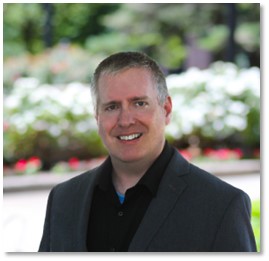 |
Following the data provided by Dr. Lueken the Committee was joined by Rev. Aaron Anderson to speak on his experience as President of Logos Academy in York, PA. Logos Academy began in 1998 as a faith-based Christ-centered school with an initial class of 14 students. The school, open to all who are looking for an alternative to their traditional public schools, now enrolls over 250 students. Rev. Anderson has served as CEO and Head of School at Logos Academy since 2014, and has overseen tremendous growth in the student body as well as the facilities offered to their students.
Logos Academy is centered in an impoverished community with some of the poorest performing public schools in the nation. Residents of York need alternatives, opportunity, and hope for their children’s future. Rev. Anderson explained that Logos Academy’s mission statement guarantees 65% of students come from families living in poverty, mainly from York City itself. Logos Academy’s full tuition is $12,000, but the average cost per student is $2,000 thanks to generous philanthropy and utilization of PA’s Education Improvement Tax Credit (EITC) program. The EITC program is a wonderful tool to encourage philanthropy towards our children’s education, but Rev. Anderson expressed that a “per-student” funding model would simplify funding and deliver more predictable funding for students and schools.
By all accounts of students and staff along the Committee tour at Logos Academy held earlier in the day, and through testing data and enrollment numbers, Logos Academy is a continuing to inspire excellence in educational opportunities for York City families. Enrollment remains slightly higher than the school’s current capacity, but new construction and a progressive plan for the future will ensure students and parents find opportunity with Logos Academy. Though not required to participate in PSSA testing, Logos utilizes DIBELS testing and MAP Growth testing twice per year. Student results show that they perform above average on standardized tests, but Rev. Anderson stressed that “Kids are more than just test scores”.
| “Most Americans are fans of school choice whether they voice that approval or not. Ask parents who are looking to move if they investigated the quality of local schools.” Rev. Aaron J. Anderson President and CEO, Logos Academy |
| WATCH: |
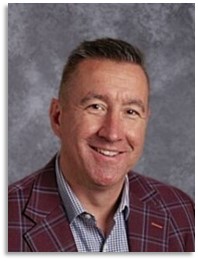 |
| WATCH: Questions for the School Choice Panel |
| Parents and Students Panel |
The Parents and Students panel included Anterria Graham, a parent of boys enrolled in York Academy Regional Charter School, Carol Thomson, a parent of a child enrolled in Christian School of York, and Eden Turnow, a senior student enrolled in Christian School of York. The panel brought the most important perspective of school choice to the forefront of the day’s hearing, the perspective of parents and students. The rationale behind each parent’s and student’s unique educational choice is different, but the overarching desire is to put control over educational choice back in the hands of Pennsylvania’s families.
The Committee was first joined by Anterria Graham, a mother of boys currently enrolled in York Academy Charter School. If her children were not enrolled in York Academy Charter School or some alternative to traditional schools, they would be in the York public school system. Anterria shared that the York Academy Charter School allowed for more involvement in her children’s education and met their specific needs, while she worried that her boys would struggle in York’s public school system. She was engaging in classroom activities and volunteer efforts that she would have never dreamed of at her local public school, and she saw tremendous growth and confidence in her children thanks to smaller class sizes and engaged teachers. School choice enabled her to provide her children the quality education she promised to them before they were even born.
| “Not all schools are the same, even within the same school district. Having a choice has been a blessing for my children.” Anterria Graham Parent at York Academy Regional Charter School |
| WATCH: |
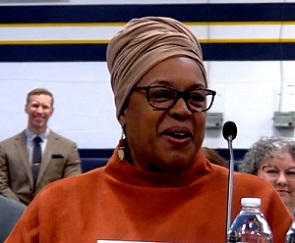 |
Carol Thomson shared with the Committee that school choice allowed her to try education methods that work best for her and her children while maintaining the Thomson family values. Carol utilized homeschooling for the initial years of her child’s education, explored public and private options, and found that Christian School of York fulfilled the needs of her child and meshed with the values of the family.
Carol shared that her children have only attended private schools, and she feels that her tax dollars have not benefited their education. She shared that Pell Grants, the GI Bill, and the Head Start program provide funding directly to the prospective student to use for their choice of education, so why must K-12 be different? As a homeschool mom Carol paid for all teaching materials out-of-pocket, along with any extracurriculars. She was willing to make this sacrifice to play a greater role in her child’s education, but it did not feel fair as a taxpayer.
| “School choice puts things in the right order. Returning the authority of the educational funds back to the parents.” Carol Thomson Parent at Christian School of York |
| WATCH: |
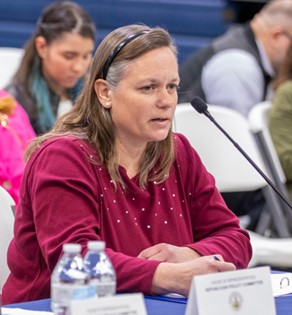 |
Eden Turnow was the final testifier of the day, she is a Senior student of Christian School of York (CSY), vice president of student council, and captain of the CSY volleyball team. Eden transferred from her public high school to Christian School of York in 9th grade, experiencing an easy transition and immediate support from her new teachers and fellow students. When Eden was first contemplating leaving the traditional public school she was enrolled in she was unaware of the school choice options available to her. Her first realization was that she was unhappy with her current school, then she found that CSY offered her the education she was looking for. School choice enabled her to find a school where she could be more active and engaged thanks to smaller class sizes and supportive teachers. Eden expressed that, in her opinion, the only minor downside to choosing a smaller school is the lack of in-school sports and some extracurricular activities, but she and other CSY students can use districts and leagues in the region. Eden wanted choice in her education, and CSY was the choice for her.
| ““I am so grateful to be at a school where I am encouraged and challenged, and where I can feel myself growing in my confidence and in my leadership skills.” Eden Turnow Student at Christian School of York |
| WATCH: |
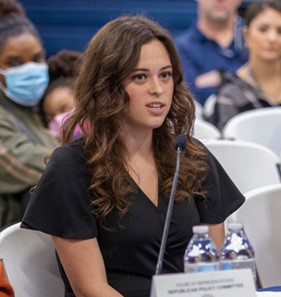 |
| WATCH: Questions for the Parents and Students Panel |